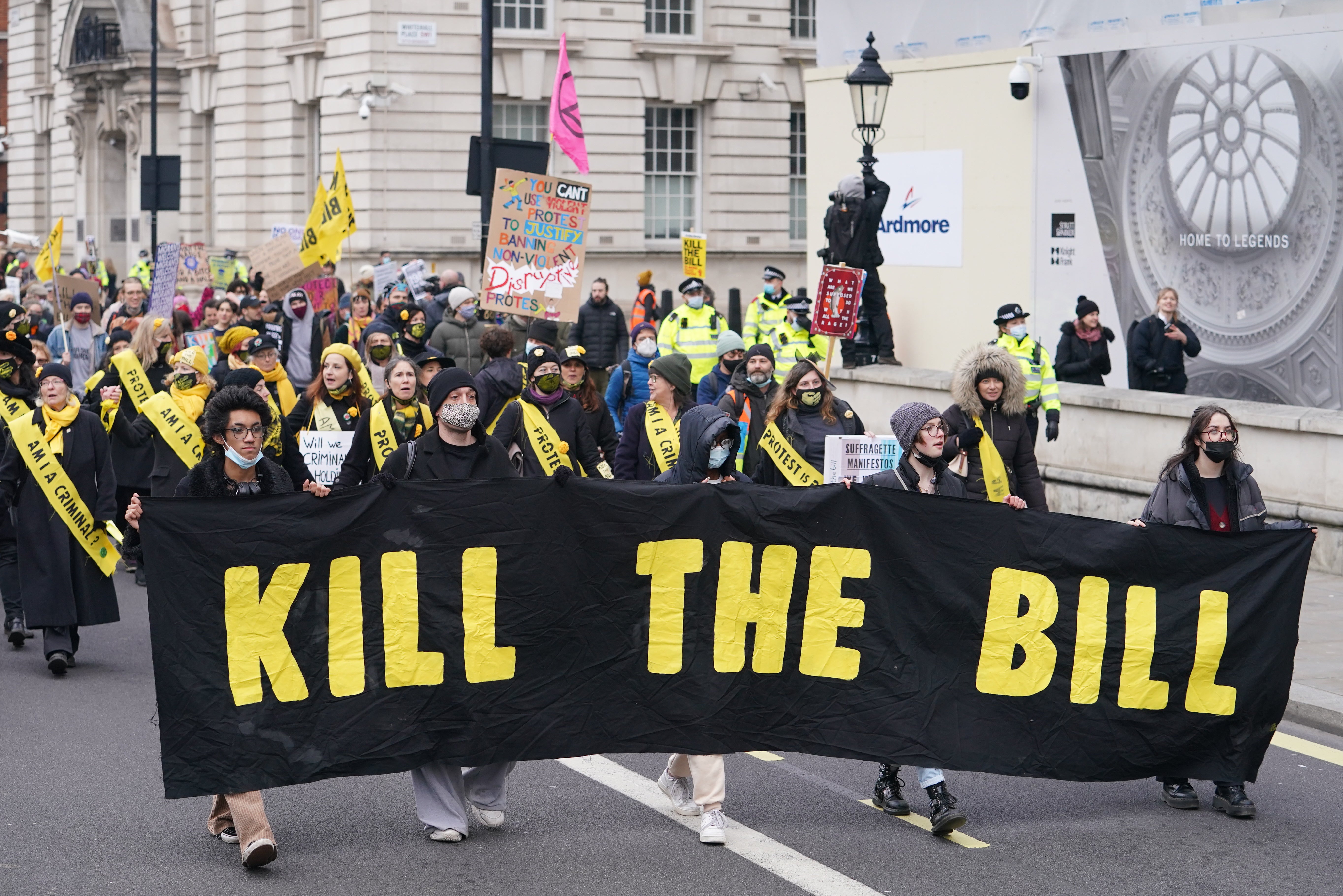Government plan to crack down on protests outside parliament defeated in Lords
Peers also inflict heavy defeat over proposed curbs on ‘noisy’ demonstrations

Your support helps us to tell the story
From reproductive rights to climate change to Big Tech, The Independent is on the ground when the story is developing. Whether it's investigating the financials of Elon Musk's pro-Trump PAC or producing our latest documentary, 'The A Word', which shines a light on the American women fighting for reproductive rights, we know how important it is to parse out the facts from the messaging.
At such a critical moment in US history, we need reporters on the ground. Your donation allows us to keep sending journalists to speak to both sides of the story.
The Independent is trusted by Americans across the entire political spectrum. And unlike many other quality news outlets, we choose not to lock Americans out of our reporting and analysis with paywalls. We believe quality journalism should be available to everyone, paid for by those who can afford it.
Your support makes all the difference.Boris Johnson’s government has been handed a blow in its plan to restrict protests outside parliament after peers backed an amendment protecting large demonstrations in the area.
Home secretary Priti Patel’s policing bill, currently making its way through parliament, would crack down on large-scale protests around parliament, Downing Street and Whitehall.
Any demonstration which makes “the passage of a vehicle more difficult” would be deemed illegal under the government’s bill – which would also restrict the use of loudspeakers in an even larger area of central London.
However, an amendment protecting legal ways to organise large protests around parliament passed in the Lords on Monday evening by 236 votes to 158.
The government was also defeated over its plan to impose conditions on protest marches judged to be too “noisy”. Peers backed a Labour-led amendment to the bill protecting the right of protests to remain loud by 261 votes to 166.
The issues will now return to the Commons where MPs will now be forced to vote on the specific issues of protests outside parliament and “noisy” demonstrations.
Lord Colville, the crossbench peer who tabled the amendment on protests outside parliament, said he hoped MPs would now “recognise that the policing bill needs to be amended so that permission can be given for these protests to go ahead.”
Naomi Smith, chief executive of Best for Britain, added: “While it’s not our only objection to this bill, this victory should give hope to everyone who believes that civil rights are not a partisan issue and that no government should be allowed to silence the people they represent.”
The defeats came as the drumming of protesters opposed to the bill outside parliament could be heard inside the chamber. “I believe that making a noise is a fundamental part of the freedom to protest properly in a democracy,” said Labour frontbencher Lord Coaker on the victory of the Labour-led amendment.
The government faced a series of ‘Kill the Bill’ protests in cities across Britain at the weekend, as those opposing the legislation criticised it as a draconian crackdown on the right to assembly.
The Police, Crime, Sentencing and Courts Bill would put protesters at risk of lengthy prison sentences and hefty fines for actions that cause “serious annoyance”, which could be done just by making noise.
Peers are preparing to vote on a series of government amendments aimed at cracking down even more widely on protests later on Monday night.
The government wants to create new offences for “locking on” – where protesters attach themselves to objects or fellow activists – as well as obstruction of major transport works and wilful obstruction of the highway.
The government has also proposed measures that would allow police to stop and search people close by to protests without suspicion. The bill would also bring in “serious disruption prevention orders” allowing police to ban named individuals from taking part in protests.
Shami Chakrabarti, Labour peer and former director of Liberty, said the government had effectively drawn up a new bill with the proposals added to the bill in November.
“Under the new measures they would be able to stop and search people without suspicion, not because they feared knife crime or terrorism, but because they fear noise and impact and disruption, which of course is inherent in any peaceful non-violent protest,” she told BBC Radio 4’s Today programme.
However, Tory MP Robert Buckland, former justice secretary, told Today: “What I see from government is reference to proportionate use of power, and that word is vitally important here … I think this bill does strike the right balance.”
A survey by Opinium on behalf of Best for Britain showed 79 per cent of people think peaceful protests should be allowed outside parliament – including 75 per cent of people who voted for the Conservatives at the last election.
Meanwhile, the government was also defeated on a so-called ‘Hillsborough Law’ amendment in the Lords. The Labour amendment – which would mean police officers would be legally required to tell the truth during public inquiries and criminal investigations – was backed by 252 votes to 179.
Yvette Cooper, shadow home secretary, said: “I urge the government to drop their opposition, respect the wishes of the Hillsborough families and others and support this amendment.”
Peers also defeated the government in backing an amendment that would make misogyny a hate crime. The proposed change to the bill would give the courts the power to treat misogyny as an aggravating factor in any crime and increase sentences accordingly.
Join our commenting forum
Join thought-provoking conversations, follow other Independent readers and see their replies
Comments